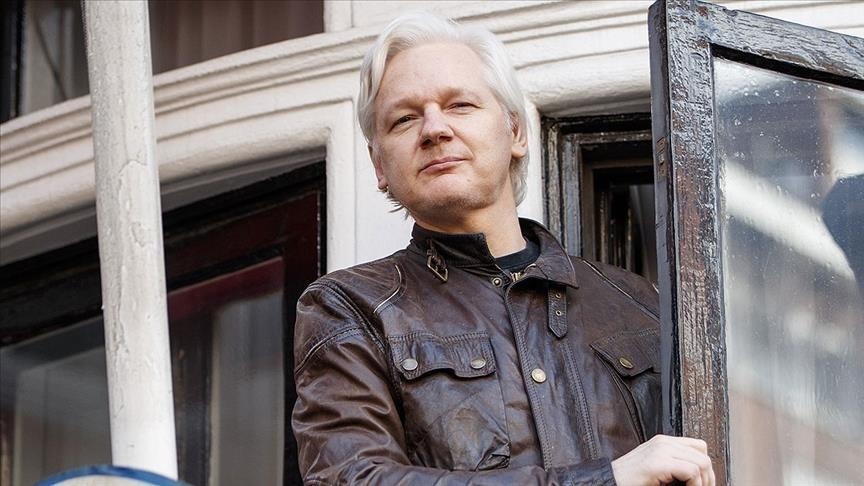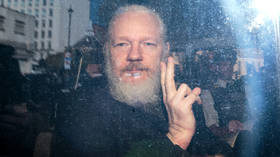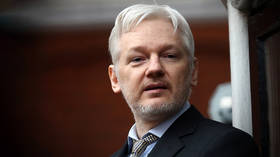April 21 2022
WikiLeaks founder Julian Assange’s extradition to the United States has edged a step closer after magistrates formally issued an order paving the way for him to face espionage charges.
British Home Secretary Priti Patel will now be responsible for deciding whether to approve the extradition after a protracted legal battle.
An extradition order was issued by chief magistrate Paul Goldspring during a seven-minute hearing at Westminster Magistrates’ Court yesterday.
Mr Goldspring said: “In layman’s terms, I am duty bound to send your case to the Secretary of State for a decision.”
Outside court, scores of supporters gathered, holding placards reading: “Don’t extradite Assange”.
The extradition may yet be further delayed by an appeal.
Assange (50) was not present in court physically, although he watched the administrative proceedings by video-link from Belmarsh Prison, London.
He appeared to form a heart shape with his hands during part of the hearing.
He is wanted in America over an alleged conspiracy to obtain and disclose national defence information following WikiLeaks’ publication of hundreds of thousands of leaked documents relating to the Afghanistan and Iraq wars.
His legal team claimed the publication of classified documents exposed US wrongdoing and were in the public interest.
They said the prosecution was politically motivated and that he faces up to 175 years in jail.
Assange, who married his fiancée, Stella Moris, last month, has been held in Belmarsh prison for three years since being dragged out of the Ecuadorian embassy in London.
Mrs Assange was in the public gallery for the hearing.
Noise from the supporters could be heard outside the courtroom.
Among them was former Labour leader Jeremy Corbyn, who told those assembled: “He’s done absolutely no more than telling the truth to the world. Julian, we will carry on campaigning.”
ByPaul Wallis
Published

Assange faces 18 charges in the US including espionage and hacking - Copyright AFP/File Biju BORO
A UK court has issued an order for Julian Assange to be extradited to the US. this order comes after many years of effective inaction and Mr. Assange’s virtual imprisonment for several years.
Materials collected and leaked by Chelsea Manning, an ex-US Army serviceman, were published by Assange as editor of Wikileaks in 2010. These materials included information regarding serious allegations of US military misconduct during the Iraq war.
Leaked materials also contained videos and other information regarding the deaths of civilians and other actions categorized under international law as war crimes. Very little legal or other action appears to have happened regarding allegations and evidence contained in this information.
An earlier UK court finding ruled against the deportation of Assange. This ruling was overturned by a superior court when the US was given the right to appeal. Assange still has the option to appeal to the High Court regarding the current deportation ruling.
A few legal perspective issues
Is leaking information regarding war crimes an offense? Against whom? The people killed or the people killing them? The mere fact that the large numbers of deaths are apparently legally worth less than the publication of the information about them deserves some attention.
The public interest: The public, of whom you have heard occasional mentions, are paying for these wars with their lives and the money of the privileged few who pay taxes. How is publication of this information NOT in the public interest? Are the public paying for unpunished war crimes?
Security leaks: What security leaks? Allegations at the time of supposed security leaks putting servicepeople at risk don’t seem to have any substance at all, especially over time. Why not?
Security breaches: Manning, a very low ranking soldier, supposedly collected this vast amount of information over a considerable period of time. To what level of security classifications could he have access? I ask because the exact significance and security status of the leaks needs to be quantified.
An explanation of how these supposedly serious breaches of security also got no further than prosecuting Manning would also be nice. …Or were they not deserving of investigation for some reason? Because on the face of it, the average local supermarket has or had more security oversight than the US military. Somebody downloads that much information and nobody notices? Come off it.
Espionage: There is no indication of espionage being conducted by Assange or Manning. No money changed hands, which it usually does in any real espionage environment. There is no reason to believe this information was published for any other reason than in serving the legitimate public interest.
Double standards 1: If this information had been leaked regarding any other nation, the person leaking and publishers would be considered true patriots. Ironically, they’d also be considered to be providing information for the purpose of justice.
Double standards 2: The publication of information that relates to war crimes is illegal? How?
Double standards 3: Information regarding the Wikileaks data was also published by every other news media site on Earth. They’re not guilty of anything? After the fact or not, they’re publishing exactly the same information.
Double standards 4: Can Assange receive a fair trial in the US? there has been absolutely no presumption of innocence or legal mitigation whatsoever. If so, how can he get a fair trial? Does the US legal system have access to jurors who haven’t read any news in the last 12 years?
… So how are we going with the course of justice?
Not too well, it seems. If reporting and publishing information related to serious breaches of US and international law is illegal, times are tough in the legal profession. Kindly note that most of the significant information published by Wikileaks relates almost entirely to reportable offenses. Personnel are supposed to report such breaches of law under military regulations and international law. Nobody did.
Manning, in effect, did exactly that. Assange published that information. Explain how that’s a crime. You may have to, you know.
Adolfo Perez Esquivel says Julian Assange is 'victim of US policy of oppression for defending freedom of press'
Ahmet Gurhan Kartal |21.04.2022

LONDON
A Nobel Peace laureate on Thursday urged all media and journalists with “civic courage” to publish US documents that show violations of human and peoples’ rights.
The letter by 1980 Nobel Peace Prize winner Adolfo Perez Esquivel underlined a British court decision Wednesday to extradite WikiLeaks co-founder Julian Assange, saying: “This decision leads to a death sentence for defending freedom of the press.”
Esquivel wrote: “We call on all media, journalists who fight for freedom to speak out and demand the freedom of Julian Assange who with civic courage, publishes US documents that violate human and peoples’ rights.
“Allowing Julian to be extradited is a threat to freedom of the press and a grave warning to those who question the repressive policies and serious violations of human and peoples’ rights committed by the United States.”
The Argentine Nobel laureate further said: “Julian Assange is a victim of US policy of oppression for defending freedom of the press. We reject the decision of the British justice system and demand the freedom of Julian Assange.”
A British court on Wednesday issued a formal order to extradite Assange to the US to face espionage charges.
The final decision on the extradition will be made by Home Secretary Priti Patel next month, which Assange will be able to appeal at the High Court if she goes ahead with a decision of extradition.
Assange will face 18 counts of hacking the US government computers and violating the espionage law if he is extradited to the US and a potential prison sentence for years. He may face a prison term of up to 175 years.
The 50-year-old was dragged out of Ecuador’s embassy building in London in 2019, where he took refuge for more than seven years.
The British police arrested him for skipping his bail in 2012 and on behalf of the US due to an extradition warrant.
Assange order shows “hypocritical nature” of US – China

China’s Ministry of Foreign Affairs has hit out against the order to extradite WikiLeaks founder Julian Assange to the US, issued by a UK court earlier this week, saying that it represents the hypocritical nature of the US government.
“This is the true face of the US 'freedom of speech and the press.' The extradition of Assange to the US can lay bare the hypocritical nature of the US government better than the WikiLeaks revelations,” said Chinese foreign ministry spokesperson Wang Wenbin, during a press conference on Thursday.
The Chinese official also noted that everything Julian Assange has gone through ever since he reported on alleged US war crimes, tells people that “those who expose the so-called atrocities of other countries are heroes, while those who expose the scandals of the US are criminals.”
A magistrates court in London issued a formal order on Wednesday to extradite Julian Assange to the US, where he will face up to 175 years in prison under the espionage charges brought against him for publishing a trove of classified State Department and Pentagon documents in 2010, which detailed alleged war crimes committed by US forces in Afghanistan and Iraq.
He has been accused of attempting to hack Pentagon computers and has been charged under the Espionage Act, which prohibits obtaining information related to national defense which can be used to undermine US interests or benefit foreign nations.
Assange’s legal team has argued that the UK court’s ruling was equivalent to issuing him a “death sentence” as the whistleblower’s defense has insisted that the US might subject him to solitary confinement and psychological torture. Meanwhile, Assange’s wife, Stella Moris, claims that her husband’s health has significantly deteriorated ever since he was placed in London’s maximum-security Belmarsh Prison three years ago, adding that he suffered a stroke in October 2021.
The prosecution of Julian Assange has sparked fierce international criticism against the US and British governments by advocates of media freedom. Assange supporters see him as a prisoner of conscience who is being persecuted by Washington and London for his work as a publisher, arguing that the case against him sets a chilling precedent which suggests that any journalist wishing to investigate misconduct by Western governments may have their lives completely ruined in retribution.
Assange has denied all accusations against him, while his defenders and supporters point out that neither he nor WikiLeaks were under US jurisdiction when documents were published. They insist Assange had engaged in journalism that is legal in the US, and that accusations of him conspiring to hack the Pentagon’s computer systems were based on discredited testimony of a convicted Icelandic criminal.
WikiLeaks’ official position on the charges is that they are politically motivated and “represent an unprecedented attack on press freedom and the public’s right to know – seeking to criminalize basic journalistic activity.”
RT
JESSICA TAYLOR / AFP / UK PARLIAMENT

ORGANISATION
RSF_en
Reporters Without Borders (RSF) has joined 19 organisations in urging UK Home Secretary Priti Patel to reject the US government's request to extradite Wikileaks publisher Julian Assange. These groups, representing press freedom, free expression, and journalists' organisations, have also requested a meeting with Patel to discuss concerns in the case. The full text of the letter is below.
The Rt. Hon Priti Patel
Secretary of State for the Home Department
2 Marsham Street
London
SW1P 4DF
22 April 2022
Dear Home Secretary,
We, the undersigned press freedom, free expression and journalists' organisations are writing to express our serious concern regarding the possibility of extradition of WikiLeaks publisher Julian Assange to the United States and to ask you to reject the US government’s extradition request. We also request a meeting with you to discuss these points further.
In March, the Supreme Court refused to consider Mr Assange’s appeal against the High Court decision, which overturned the District Court ruling barring extradition on mental health grounds. We are deeply disappointed with this decision given the high public interest in this case, which deserved review by the highest court in the land.
However, it is now in your hands to decide whether to approve or reject Mr Assange’s extradition to the US. The undersigned organisations urge you to act in the interest of press freedom and journalism by refusing extradition and immediately releasing Mr Assange from prison, where he has remained on remand for three years despite the great risks posed to his mental and physical health.
In the US, Mr Assange would face trial on 17 counts under the Espionage Act and one count under the Computer Fraud and Abuse Act, which combined could see him imprisoned for up to 175 years. He is highly likely to be detained there in conditions of isolation or solitary confinement despite the US government’s assurances, which would severely exacerbate his risk of suicide.
Further, Mr Assange would be unable to adequately defend himself in the US courts, as the Espionage Act lacks a public interest defence. His prosecution would set a dangerous precedent that could be applied to any media outlet that published stories based on leaked information, or indeed any journalist, publisher or source anywhere in the world.
We ask you, Home Secretary, to honour the UK government’s commitment to protecting and promoting media freedom and reject the US extradition request. We ask you to release Mr Assange from Belmarsh prison and allow him to return to his young family after many years of isolation. Finally, we ask you to publicly commit to ensuring that no publisher, journalist or source ever again faces detention in the UK for publishing information in the public interest.
We request to schedule a meeting at your earliest convenience, and would be grateful for a prompt response. Please reply via Azzurra Moores at Reporters Without Borders (RSF) at amoores@rsf.org.
Sincerely,
Rebecca Vincent, Director of Operations and Campaigns, Reporters Without Borders (RSF)
Sarah Clarke, Head of Europe and Central Asia, ARTICLE 19
Mark Johnson, Legal and Policy Officer, Big Brother Watch
Dr Suelette Dreyfus, Executive Director, Blueprint for Free Speech
Daniel Gorman, Director, English PEN
Laurens Hueting, Senior Advocacy Officer, European Centre for Press and Media Freedom (ECPMF)
Ricardo Gutiérrez, General Secretary, European Federation of Journalists (EFJ)
Ralf Nestmeyer, Vice-President and Writers-in-Prison Officer, German PEN
Index on Censorship
Anthony Bellanger, General Secretary, International Federation of Journalists (IFJ)
Séamus Dooley, Assistant General Secretary, National Union of Journalists
Romana Cacchioli, Executive Director, PEN International
Christine McKenzie, President, PEN International Melbourne Centre
Kjersti Løken Stavrum, President, PEN Norway
Zoë Rodriguez, joint President, PEN Sydney, and Chair of the PEN International Women Writers Committee
Peter Tatchell, Director, Peter Tatchell Foundation
Ricky Monahan Brown, President, Scottish PEN
Tanja Tuma, President, Slovene PEN
Jesper Bengtsson, President, Swedish PEN

No comments:
Post a Comment